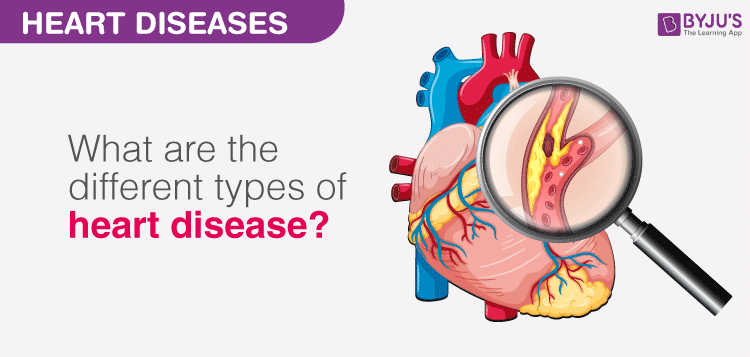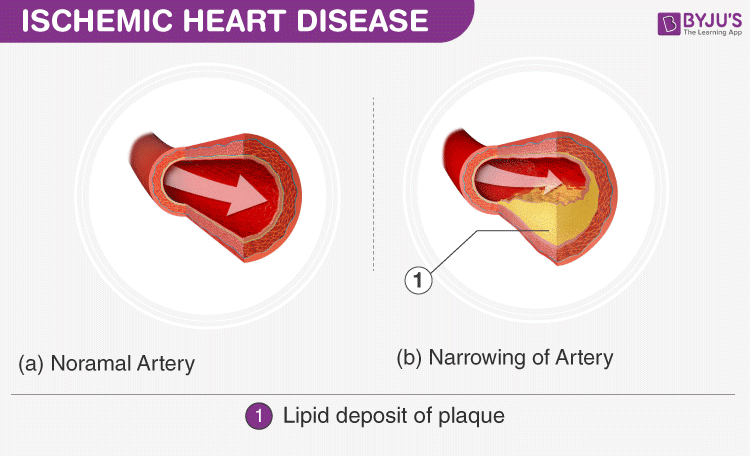Table of Contents
- Rheumatic Heart Disease
- Valvular Heart Disease
- Hypertensive Heart Diseases
- Cerebrovascular Heart Disease
- Inflammatory Heart Disease
- Ischemic Heart Disease
A heart is a muscular organ that pumps blood through the circulatory system by expansion and contraction. Any condition that affects the heart or its function results in heart disease. Medically heart disease is called cardiovascular disease.

What are the different types of heart disease?
Rheumatic Heart Disease
Rheumatic heart disease is a chronic heart condition caused by rheumatic fever. This is a very common heart disease in children. This disease is more prevalent in developing countries, especially in areas of poverty.
Acute rheumatic fever is an inflammatory disease that primarily affects joints, the heart, and central nervous system. Heart valve damage is the most common result of rheumatic fever. Pericardium (outer sac) and endocardium (the inner lining) may be damaged due to the inflammation caused by the rheumatic disease.
Rheumatic fever generally starts with strep throat and develops into a fever. This development can be prevented by taking antibiotics or penicillin.
Symptoms
Heart valve problems are the result of rheumatic fever and it’s symptoms include
- Chest pain
- Excess fatigue
- Heart missing a beat
- Thumping sensation in the chest
- Swollen ankles
- Fainting etc.
Treatment
Treatment depends on the severity of the disease. Treatment for rheumatic heart disease generally includes
- Antibiotics for strep throat and prevent rheumatic fever.
- Medicines that are helpful for blood thinning to prevent heart stroke.
- Surgery for repairing heart valves.
Valvular Heart Disease
If any of the valves of the heart ( aortic, mitral, pulmonary and tricuspid valves ) are damaged, it results in valvular heart disease. The basic reason for this disease is the damage to heart valves due to age.
The functions of these valves are to ensure that blood is flowing at the right speed in the right direction. In valvular heart disease conditions, the valves of the heart become very thin and hard that changes the rate and speed of blood flow in the system. Sometimes they may be completely closed.
Symptoms
Symptoms of this disease are very sudden. This disease advances slowly and heart adjusts to it and it becomes very difficult to find the symptoms. General symptoms are almost similar to rheumatic heart disease. Symptoms are:
- Giddiness
- Excess fatigue
- Palpitations
- Chest pain
Treatment
Following are the treatment options:
- Long term antibiotic therapy
- Medications which prevent clotting
- Balloon dilatation
Hypertensive Heart Diseases
High blood pressure is the cause of this disease. It overburdens the heart and blood vessels causing damage to them. Following are some of the hypertensive heart diseases.
- Aneurysm
An aneurysm is a bulge or swelling of the artery. An aneurysm may be silent but causes serious problems, sometimes even causes death. An aneurysm can happen in any part of the body ie., brain, nervous system, etc.
- Atherosclerosis
This is a condition in which walls of arteries become stiff and thick due to the accumulation of fat deposits called plaques. This, in turn, restricts the blood flow in the system. Atherosclerosis can occur in any part of the body. If atherosclerosis occurs in the heart then it is coronary artery disease. If this occurs in the legs then it is peripheral artery disease.
-
High blood pressure
As the name suggests, the pressure of blood flow increases in the blood vessels leading to many cardiovascular diseases like heart failure, renal failure, etc.
Cerebrovascular Heart Disease
Cerebrovascular heart disease is a condition in which blood circulation to the brain is affected. This is caused mainly due to atherosclerosis. As discussed earlier, atherosclerosis is a condition in which walls of arteries become stiff and thick due to the accumulation of fat deposits.
Blood pressure affects blood flow leading to ischemic stroke and a rise in blood pressure leads to tearing of blood vessels which may lead to intracranial haemorrhage.
Causes
Atherosclerosis, embolism, low-fat states, and aneurysms are the basic or primary causes of cardiovascular heart disease. Risk factors include hypertension, smoking, diabetes, and obesity.
Treatment
Treatment for cardiovascular disease involves surgery, lifestyle changes, and medications.
Medications include antiplatelets ( like aspirin, clopidogrel ), blood-thinning medications (like heparin, warfarin ) and anti-diabetic medications.
Surgery’s include:
- Vascular surgery
- Endovascular surgery
Inflammatory Heart Disease
Inflammatory heart disease is caused due to inflammation of the pericardium. Causes of this disease include
- Bacterial or fungal infection
- Heart attack and myocarditis
- Due to radiation therapy to the chest
- Use of medications that suppress the immune system
- Due to diseases such as cancer, leukaemia, tuberculosis, kidney failure etc.
Symptoms
- Severe chest pain
- Difficulty in breathing when lying down
- Dry cough
- Anxiety
- Excess fatigue
Treatment
The main goal of the treatment is to
- Suppress acute inflammatory process
- Eradication of streptococcal infection
- Prevent the further occurrence of disease
- Protect heart against damaging effects of carditis
Ischemic Heart Disease

Ischemic heart disease is a wide range of heart diseases caused by the decreased supply of oxygen to the myocardium i.e. the muscle of the heart. It is also known as coronary artery disease
Angina
Angina is caused due to a reduced supply of blood to the heart. Blood carries oxygen throughout the body and depriving the heart of oxygen will have fatal consequences.
Angina starts with chest pain and it spreads to the left arm, shoulder and jaw. It occurred due to shortness of breath and sweating.
Causes of Ischemic Heart Disease
- Risk factors include smoking, diabetes mellitus, and cholesterol levels.
- Genetic and hereditary factors may also cause this disease.
- Hypertension
- Stress is also a risk factor
Treatment
Treatment of Ischemic heart disease includes medications like
- Organic nitrates help to relax the non-specific smooth muscles.
- Beta-blockers help to reduce cardiac work and increase oxygen consumption.
- Aspirin reduces the risk of angina.
- Calcium channel blockers reduce the total coronary flow by blocking beta receptors.
To learn more about heart-related disorders, visit BYJU’S.
Frequently Asked Questions on Heart diseases
What is coronary artery disease?
It is the condition in which the coronary artery struggles to send blood to the heart muscles. This occurs due to high cholesterol levels and inflammation in the arteries.
What is heart attack?
A heart attack is also known as a myocardial infarction. It occurs when the part of the heart muscle could not get enough blood supply. Coronary artery disease is the major cause of heart attack.
What is coronary angioplasty?
Coronary angioplasty is a medical procedure done to open the blocked coronary arteries. A balloon catheter is used to place a stent which widens the artery and allow the flow of blood.
What is pacemaker?
It is a device used to regulate the slow heart rate. It is implanted in the chest of an individual.
What is bad cholesterol?
Low density lipoprotein [LDL] is also known as bad cholesterol. High levels of LDL deposit on the walls of artery and narrows them. This results in Coronary artery disease and stroke.

nice questions